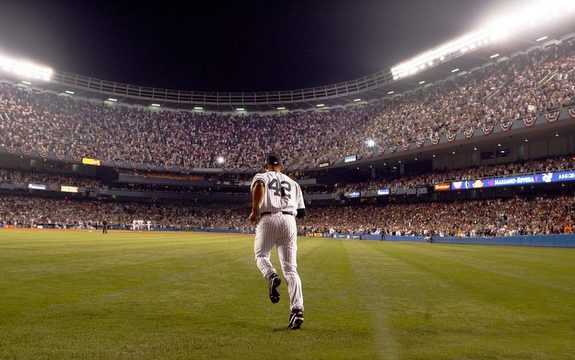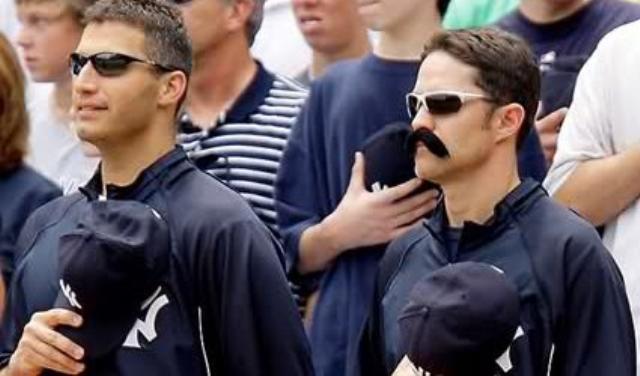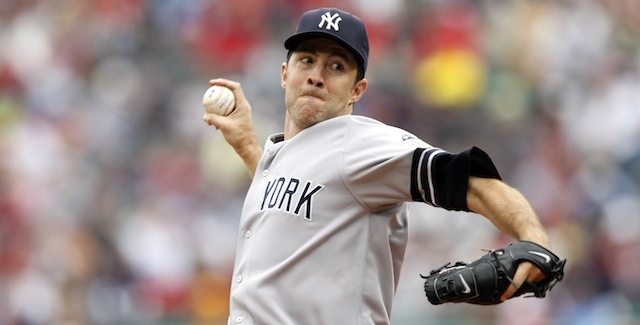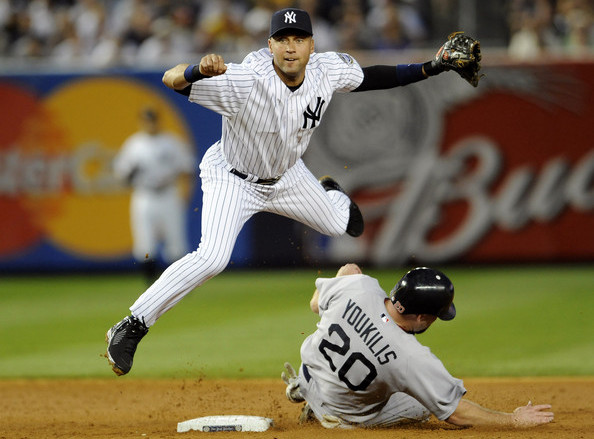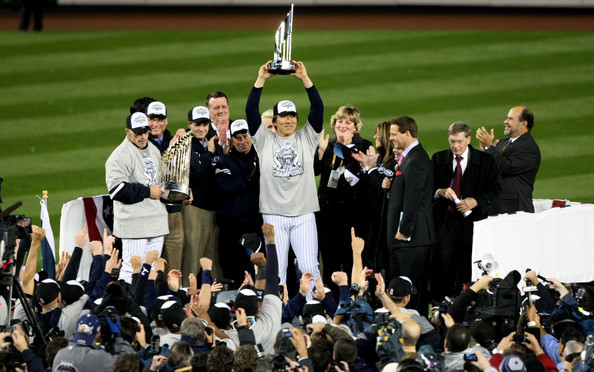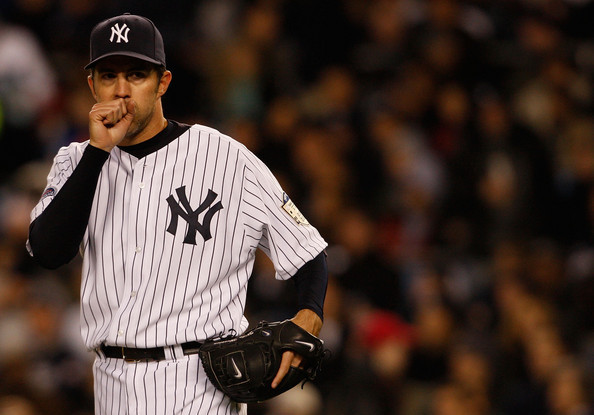
You’ve likely come to this fine website for astute baseball analysis, but allow me a modicum of whimsy.
I recently found out that in Alex Rodriguez’s original 10-year deal with the Rangers, there was a standard awards clause, giving out bonuses if he achieved various results. This awards clause was curious, however, as it included a bonus for Division Series MVP.
There is no Division Series MVP. There has never been a Division Series MVP. There is no good reason for a Division Series MVP … but what if MLB gave it out anyway?
Would A-Rod have won one or two ALDS MVPs with the Yankees? Almost assuredly. Therefore, I went back through all of the Yankees’ ALDS victories and determined the rightful winner of this non-existent award. First up, 1996.
1996 ALDS MVP: Bernie Williams
The King of the Division Series, Bernie Williams caught fire in the 1996 ALDS. He posted the highest WPA of any non-reliever and went 7-for-15 with three home runs. When you add further context, it simply gets better.
Bernie singled and scored the game-tying run in the eighth inning of Game 2 as the Yankees trailed the series. He homered in the first inning of Game 3 before tying it late with a sacrifice fly. Finally, he tied and capped the clincher with his final homer of the series. Enough said!
1998 ALDS MVP: Shane Spencer
Shane Spencer should not get this award. He was going to be a replacement player in 1995 and, in more relevant arguments, only played two games in this series.
But he hit two dingers!
The Yankees gave up just one run over three games with Davids Wells and Cone alongside Andy Pettitte dominating. However, I’m not going to give this to three people at once. I’m not going to split this award either. This has to go to one player and Spencer is it.
Spencer homered to put the Yanks ahead in Game 2 before singling and scoring two innings later. In Game 3, his three-run homer in the sixth inning put the game, and thus the series, out of reach. Normally, this isn’t enough for a series MVP, but it’s enough here.
1999 ALDS MVP: Royce Clayton
Royce Clayton didn’t play for the Yankees. What? I’ll explain.
This is the type of series why this award does not exist. The Yankees won the series in a rout with a 14-1 lead in aggregate and only one semi-interesting game in the middle.
I just couldn’t bring myself to award any particular Yankee. Derek Jeter went 5-for-11 with a double, triple and two walks. Mariano Rivera had two saves and three innings pitched. Bernie had six RBI and went 4-for-11 after pouring it on late in a blowout Game 1.
So I’m giving it to Clayton, the Rangers’ shortstop. He went 0-for-10 in the series, distinguishing himself among the Rangers’ hitters, who only mustered 14 hits and a .152/.228/.207 collective batting line. Yuck.
2000 ALDS MVP: Mariano Rivera
You could give Rivera about four of these awards (1996, 1998-2000, 2003). He has to get at least one, in my award-giving opinion, and this was his most impactful series.
Rivera saved all three wins in the 2000 ALDS — which went the distance — and threw five important innings along the way. He gave up just two hits, walked no one and struck out two Athletics.
Though all three of his saves came in multi-run victories, Rivera entered Games 2, 3 and 5 with the tying run at the plate and deftly navigated each situation. Game 5 was essentially a six-run first inning followed by scratching and clawing to get to Rivera. Let’s call this one a unanimous selection.
2001 ALDS MVP: Derek Jeter
Jorge Posada has been overlooked for his entire career. Perhaps not as much as Williams recently as Posada made the “Core Four” but based on his Hall of Fame vote totals and by playing next to Rivera and Jeter, he didn’t get the credit he deserved.
And by the numbers, he should be the 2001 ALDS MVP. He went 8-for-18, hit the homer for the lone run of the pivotal Game 3 to turnaround the series. He compiled a 1.167 OPS.
But the Flip Play happened.
Sorry, Jorge. I tried.
2003 ALDS MVP: Bernie Williams
Going just on raw numbers, Jeter would win again. He went 6-for-14 with four walks, a homer and a 1.198 OPS. However, the homer was meaningless and he already stole the award from Posada.
Outside of a loss in Game 1, this was reminiscent of the 1998 and 99 ALDS with three good starts in a row, but no one of the starters can get the award. Rivera could once again win this, but he’s not going to be the first two-time award winner here.
Therefore, we’re going with Williams, who was at the center of the action in the three wins. He hit a sac fly to put the Yankees up in Game 2 early, scored the go-ahead run and knocked in an insurance run in Game 3 and put the team up to start the knockout rally in Game 4.
2004 ALDS MVP: Alex Rodriguez
The whole point of this exercise was to get the obscenely wealthy Rodriguez his extra $100,000 or so and he gets it right off the bat.
A-Rod essentially wins it for Game 2 alone, as the Yankees knotted up the series in dramatic fashion. He homered in the fifth to put NYY up one before extending the lead with a single in the seventh. After a rare Mariano Rivera meltdown, the game went to extras and the Yankees trailed in the 12th. Don’t worry, Joe Nathan came on for the save and Rodriguez hit a game-tying, ground-rule double and set up the winning run two batters later.
After a quiet Game 3, he went 2-for-4 with two walks in Game 4 and scored the series-clinching run in the 11th inning by doubling off Kyle Lohse, stealing third base and scoring on a wild pitch.
2009 ALDS MVP: Alex Rodriguez
While A-Rod already got his bonus for the 2004 series, the 2009 ALDS was his piece de resistance. It was an undisputed masterpiece. He had two RBI singles in Game 1 to pad the Yankees’ lead en route to 7-2 win. He hit a tying homer in Game 3 to lead another comeback win.
But this is all you really need to know.
2010 ALDS MVP: Curtis Granderson
In a three-game series, the MVP comes down to one game, if not one moment. There isn’t enough time for a starting pitcher to go twice, so whoever makes the play or comes through with the key hit would earn it. This is precisely the reason why there’s no ALDS MVP in reality, 2009 A-Rod being a supernova exception.
With two men on and two outs and the Yankees down 3-2 on the road, Curtis Granderson came to the plate against Francisco Liriano, who was 100 pitches into his start. This was a guy coming off a career year facing Granderson, who could barely make contact against lefties.
But Granderson smacked a ball to right-center that carried. And carried. In most parks, it would have left, but it went for a triple to put the Yankees in front. Mark Teixeira hit the game-winning homer an inning later, but Granderson’s shot was the turning point where it came apart for Minnesota.
Tex has a cogent argument for MVP, but I’m handing it to Grandy after he put up better overall numbers, going 5-for-11 with a double, the triple, three RBI and a walk in a precursor to his near-MVP season.
2012 ALDS MVP: CC Sabathia
Raul Ibanez stole the headlines in this series with his two Game 3 homers and his go-ahead single in Game 5. Normally, just those moments would be enough to win the short series MVP.
But CC Sabathia won two games nearly by himself and shut down the Orioles’ hopes of an upset, even with Ibanez’s advantage in WPA (0.90 to 0.84). CC threw 8 2/3rds in Game 1 of a closely-contested matchup and went the distance in Game 5.
Game 5 was likely the last peak CC Sabathia game. He’s had some big playoff moments since, but he hasn’t been the ace or workhorse in the regular season or playoffs after that game. He threw 121 pitches, allowed just six baserunners and held Baltimore to one run, striking out nine. He capped it off by throwing out a runner at first and clinching the series. Well done, big man!
2017 ALDS MVP: Didi Gregorius
There wasn’t a clear statistical victor in this one. Sabathia had a solid Game 5 and underrated Game 2, but he didn’t get the win in either start and wasn’t dominant. Nearly every hitter and reliever had a big moment, but no one stood out. Aroldis Chapman would have been an OK choice if one player didn’t steal the show in Game 5.
And it was Didi Gregorius who stole said show in the winner-take-all finale. His two home runs off Corey Kluber were enough to give the Yankees the series. I still get goosebumps watching this.
If there was an ALDS MVP, history looks more favorably upon A-Rod, who was often destroyed for his playoff woes. Rivera, Williams and Jeter get their just due for postseason excellence that wrapped into two decades. Meanwhile, one or two hits get Spencer and Gregorius immortality while the lack of a hit dooms Clayton into shame.
P.S. Sorry again to Posada.


